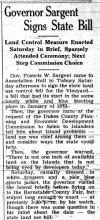After 14 revised drafts and nearly a year of public discussion, a final set of regulations aimed at protecting the historical and ecological character of Vineyard Haven harbor is on the verge of completion.
A final draft of regulations was still in the works Monday evening for the Vineyard Haven Harbor District of Critical Planning Concern (DCPC), which will be presented to the Martha’s Vineyard Commission Thursday at 7:30 p.m. at the Oak Bluffs office.
After public discussion and if the commission approves the special regulations, the DCPC will go to a town meeting for a vote that determines whether or not the proposed regulations become a town zoning bylaw.
“This is going to give [the town] the opportunity to address some concerns they have had about the harbor and take some actions that they may not be able to take under state laws,” said Chuck Clifford, executive director of the MVC. “I think it’s a good thing. They have a great little harbor.”
The eight-page, nine-part document, designed “to maintain and enhance the cultural heritage and the economic vitality of the Vineyard Haven harbor and waterfront,” spells out in great detail what is permitted and what is not in the harbor and on the waterfront pertaining to businesses, landowners and vacationers.
While most traditional uses of the harbor will be unaffected, some activity will require harbor-use permits. Specific details of which uses will require permits are still under discussion. But permits will be required for commercial uses such as water taxi and commercial launch service, oceanographic research, freight and ferry service, seaplane and floatplane service, dredging, the laying of underwater cables and Coast Guard-approved private aids to navigation.
Those owning piers within the district will not be allowed to use them for commercial purposes without a harbor-use permit citing the specific intended use.
The current regulations also consider the land areas surrounding the harbor and focus on protecting the rights of pedestrians while keeping close watch on the business owners in the area.
All persons are granted the right to engage in private, noncommercial activities in the West Beach area that do not interfere with navigation or pose public health risks or restrict public access.
The regulations would prohibit the pick up and unloading of passengers for money from a pier or beach from any vessel over 100 feet, or carrying over 50 persons, excluding traditional sailing vessels and ferries operating pursuant to valid harbor-use permits. Installation or construction of new bulkheads would not be permitted; with the exception of the working waterfront area, constructing new piers or adding to old ones is also prohibited. Discharge of treated and/or untreated effluent would be prohibited, as would the building or maintenance of any structure blocking pedestrian access along the waterfront.
Though still in the final stages and subject to change at Thursday evening’s meeting, the shaped and reshaped special district regulations have gained support and momentum in the past 10 months, demonstrating the strong stance the town’s citizens and officials are taking in protecting Vineyard Haven harbor.
“I think the DCPC will do what the town wants,” said Jo-Ann Taylor, coastal planner for the MVC, who gave the town technical assistance to make sure the planned regulations were consistent with commission guidelines.
“When the selectmen first nominated the district, what they wanted was to establish control over the harbor, [control] they saw was eroding away. They realize what a treasure the harbor is and they don’t just want to stand by and let things go on and destroy its value.”
Copies of the current regulations are available at the Tisbury town hall and the Martha’s Vineyard Commission office.







Comments